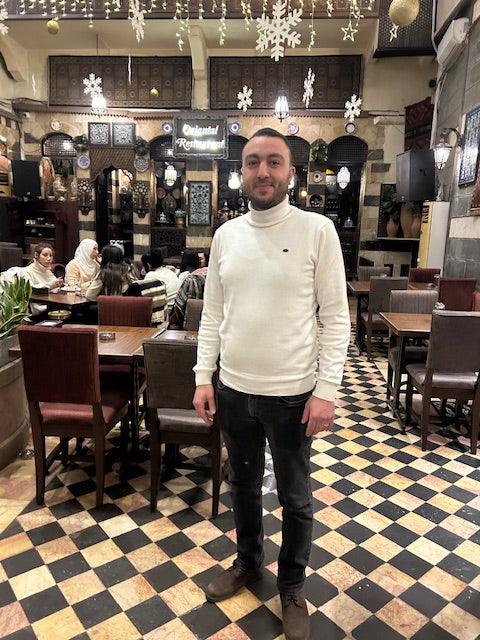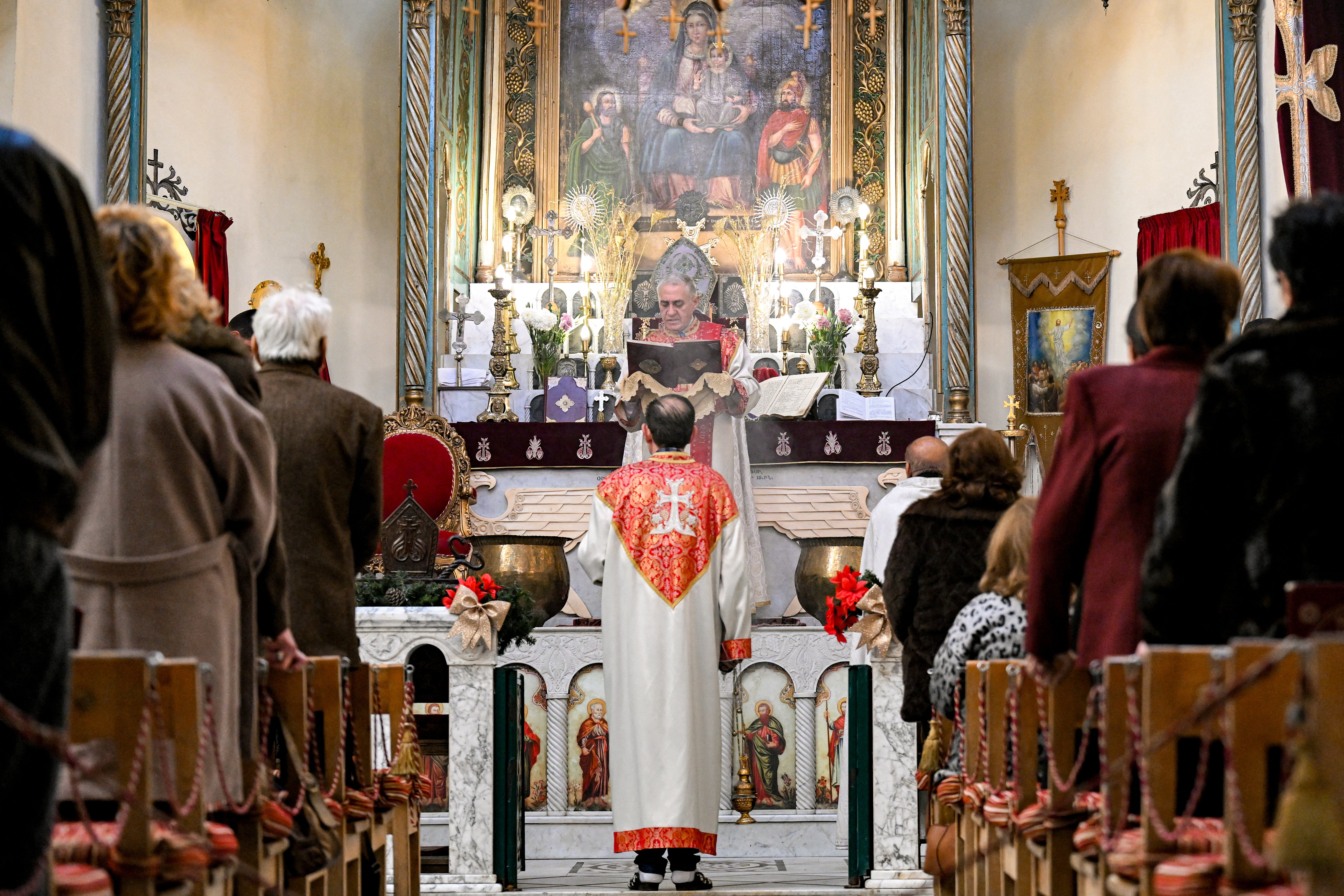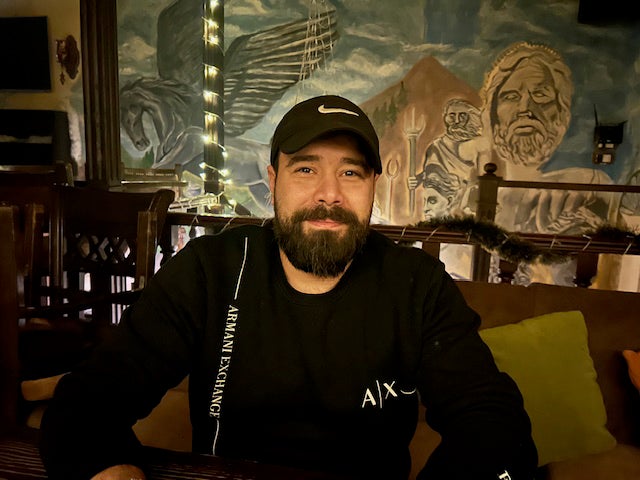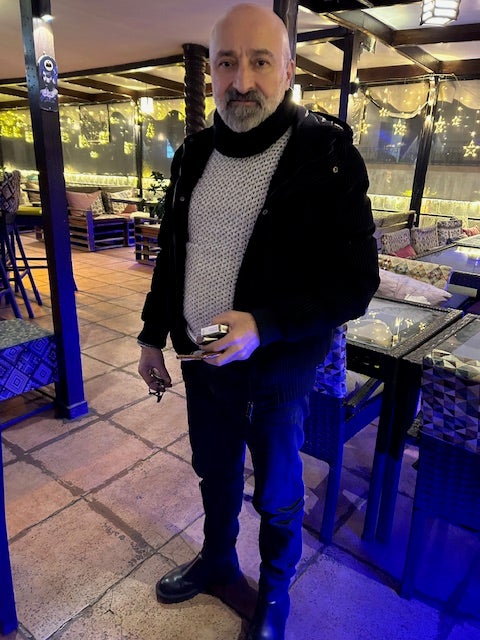'Everyone is afraid’: Why Christians are fearing for their lives under Syria’s new regime
The fall of Bashar al-Assad after a violent 13-year civil war was hailed as a new era for the embattled country. But, after just two months, many are fearful that one dangerous regime has been replaced by another. Harry Stourton reports

The rapid dissolution of the Assad regime was initially met with euphoria on the streets of Damascus – disbelief, even, that the administration that so violently put down the protests of its own people had finally been removed.
But less than two months on, there is a growing sense of anxiety, increased lawlessness, and a rising suspicion about the true ideology of the new government, led by former rebel leader Ahmed al-Sharaa, the head of the Islamist Hayat Tahrir al-Sham (HTS) group who was last week named as the country’s transitional president.
The developments have left many – particularly in Syria’s significant minority communities – deeply afraid.
“It’s not just the political prisoners they let out; it’s all the prisoners. Criminals, thieves, murderers, rapists – they’re all on the streets now. The jails are empty,” says Krikor Altounian, manager of the boutique Oriental Hotel, which is nestled down an alleyway in the Christian quarter of the city’s old town.
“The regime’s collapse has left a vacuum of power. There is no police force to speak of. The traffic is terrible, crime is rising, and law and order hang in the balance.”
Altounian, an Armenian Christian, expresses a concern shared by many of Syria’s religious minorities about the ideology of the new rulers in Damascus. “The city has always been moderate. Alcohol is tolerated in all communities, and Muslim women don’t wear hijabs,” he explains. “These men come from the Al-Nusra Front, which has strong ties to al-Qaeda and Isis. We fear they will rule in an extremist manner.”
In one of the oldest continuously inhabited cities in the world, Muslims – Shia, Sunni, Alawite, and Ismaili – mingle with the many different Christian sects. On the bustling Bab Sharqi street, Fatima Saleh and her sister Nadia survey the damage to their jewellers and optician shop at the edge of the bazaar, which has been robbed.
Pointing to some empty cabinets, Fatima explains, “Look, here – they smashed the lock. We tried to report it to the police, but they no longer exist. We are really scared.

“It is not safe to travel outside of Damascus. There is stealing and killing. It looks like things are going in the wrong direction.”
Fatima and Nadia are from the minority Muslim Alawite community, which makes up around 10 per cent of the population.
“We are hearing troubling stories. They’ve started forcing the segregation of men and women on buses in Homs and Hama. We don’t want to be forced to wear hijabs or have our freedoms restricted.”
Fatima says she is taking no chances. “I’m holding my passport close by. My bags are packed, and I’m ready to leave at a moment’s notice. We will go to the Emirates.” She continues, “All the Christians, Alawites, and Druze I know are thinking of leaving.”
Her sister, Nadia, is an Alawite, but her boyfriend is Christian. “We don’t think it will be acceptable for them to be in an interreligious relationship,” Fatima adds.
Syria is a Sunni-majority country, but its Christian and Muslim minority sects account for between 15 and 25 per cent of the population. The Christian population has declined significantly since 2011, largely due to the civil war and subsequent emigration, decreasing from about 10 per cent of the population to, by some estimates, as low as 2 per cent.
The new leadership is at pains to reassure the minorities who remain. In a symbolic move, Mr Sharaa, Syria’s de facto leader, met with the Christian leaders in Damascus on New Year’s Eve. Since taking power, he has repeatedly emphasised the importance of a unified state, “where no sects will be excluded,” claiming “it is our duty to protect them”.
In what some have interpreted as an encouraging sign, the new government has appointed Muhsina al-Mahithawi, a woman from the minority Druze community, as governor of the southern province of Suwaida. Women have also been given other prominent positions such as governor of the central bank.
Still, many remain unconvinced. Up the road, La Marionnette Bar and Pizzeria is an old-town institution in Damascus. Sitting at the bar is Maryam, an Aramean Christian.

“We are living a nightmare. This is the most terrifying period of our lives. We’ve replaced one dictatorship with another, in a different shape,” Maryam says. “Christians are fearing for their lives. If they have a passport, they are preparing to leave.” Maryam is one of the lucky few who have a foreign passport. “In the name of humanity, I urge the international community to save the Christians.”
“HTS has committed terrible massacres and terrorist acts over the last 13 years,” says Maryam’s cousin, Shadi Marine, a Christian Orthodox, and owner of the Roof of Marine restaurant.
It’s hard not to be struck by the universal pessimism among the minority communities. Lina Sabbagh is a pharmacist and a Christian. “Everyone is afraid. We are afraid to go to church now. There are many talented people in Syria and huge diversity, but not in the government. They are all Islamists. I don’t want to leave; my business is here, but I think I must.”
At a café opposite the imposing entrance of the Greek Catholic Cathedral of Our Lady, further down the street, sits Ali Mohamad. Drinking an espresso, he inhales deeply on a cigarette as the call to prayer sounds from the neighbouring mosque. He looks visibly stressed; his brow furrowed as he stares into his coffee.

“I’m worried I’ll have to face the consequences of my religion. I’m Alawite, same as Bashar al-Assad,” says Ali, a cybersecurity consultant.
“I don’t want to lose hope, as I love Damascus and Syria’s rich culture. Most Muslims here are open-minded, and I have friends from all sects. There are disturbing accounts of Druze, Alawites, and Christians being verbally insulted in the countryside and in Homs. I’m not confident in these new leaders. They don’t have the capacity to rule the whole country. They ruled Idlib, which was small. All the new leadership are former terrorists. People are starting to talk about the balkanisation of Syria, where the minorities have their own states under international protection.”
Ali says he, too, is looking for a way out: “I don’t want to bet on the situation.”

After years of oppression and dictatorship, many people are still afraid to speak out. Outside of the minority communities, even many Sunnis declined to comment, expressing hope that it would all work out but unwilling to be interviewed. But some who would speak were more optimistic.
Down a narrow alley next to the La Marionnette Bar is the Zaroob RestoBar and nightclub. Hip Arabic dance music is playing, and Jad, a Sunni, is the manager. He points to the fashionable group of young Syrians dancing and drinking.
“Look, this is Syria, man. These people are Muslims and Christians dancing and drinking together. We don’t have any problems with anyone. No one is asking us to stop drinking or stop dancing. Everything is good. The new government is coming to us in peace. Ahmed al-Sharaa is respecting all Syrian people.”

Back at La Marionnette, I tell Maryam and Shadi about the optimism of some Sunnis.
“This is just happy hour after the revolution,” exclaims Shadi Marine. “Right now, the moderate Sunnis are cheering on these guys, but as soon as they figure out they are Jabhat al-Nusra, a branch of al-Qaeda, they won’t accept it. There are 24,000 Islamic extremist fighters, many of whom are foreigners. Who is going to deal with them?”
I ask Shadi if he has any plans to leave, like the others.
“I will not leave. I will stay and do everything for a moderate Syria. I am weak; I have no weapon, we are not a violent people but this is our land and I will die here.”
Since taking office, Trump has not spoken about Syria, but The Washington Post reported last week that the US has shared intelligence with the new government about threats from Isis.
During testimony at his Senate Foreign Relations confirmation hearing, secretary of state Marco Rubio said it was in “the US national interest to have a stable Syria that’s no longer a playground for Isis, that respects religious minorities from Alawites to Christians and protects the Kurds”. He went on to say it was also in the interest of every nation in the Middle East.
Back at the Oriental Hotel, Krikor Altounian insists he is still hopeful. “We must not forget the external interests. Turkey, Saudi Arabia, Qatar, the West – Syria is strategically important. An unstable Syria is not in their interests.”
His family have owned and run their hotel since 2004, and he hopes for better times, but Krikor says he’s not giving up his insurance – his Armenian passport.



Join our commenting forum
Join thought-provoking conversations, follow other Independent readers and see their replies
Comments